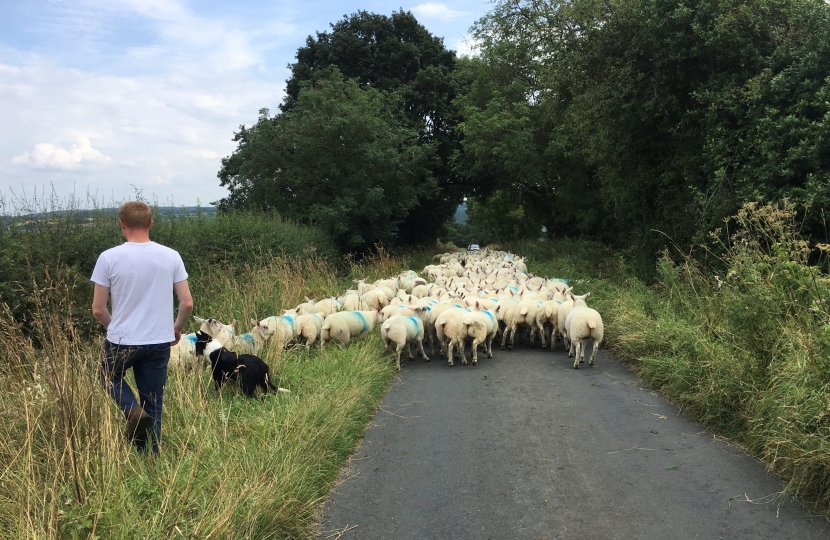
Many people have kindly contacted me about the Agriculture Bill which is being debated today. In the limited time which had available to speak, here is a copy of my speech delivered in the Chamber.
Thank you, Madame Deputy Speaker
This Agriculture Bill is a once in generational opportunity to shape our farming sector for the better.
In the short period of time which I have to speak, I would like to discuss the proposed amendments (New Clause 1 and 2) brought forward regarding food imports and standards.
I have given immense thought to these amendments over the last few days.
Thinking back, just a few years ago when I was lucky enough to travel across the globe undertaking a research project specifically looking at the global ag sector, one thing, above all else that came across loud and clear was just how small a dot the UK is considered by others on the world stage when it comes to influencing the global agricultural sector, but also our lack of any real penetration previously into global food markets.
But this country is now on a new and exciting course. One in which we can forge new food export opportunities and by doing so, one which I believe our UK agricultural industry can exert real influence on the global stage - by promoting our high animal welfare standards and ensuring the high environmental bar which our farmers adhere to here, are also met abroad.
But as we consider this Agriculture Bill and look ahead to our new future, the question which I have been mulling over is what is the best mechanism that ensures our domestic agricultural industry thrives and is truly sustainable long into the future, whilst also being able to show real leadership on the global stage by promoting high animal welfare, environmental and food safety standards abroad.
We have a truly credible sector, producing the finest food the world has to offer, and I want to see our farming industry thrive, with food production at its heart, and that means ensuring strong market opportunities here, but also abroad.
The phrasing of the amendments (New Clause 1 and 2) definitely seem attractive and I totally agree that their aspirations are profoundly correct. But the question is, by including these amendments into this Agriculture Bill, which is domestic policy, are they legally binding on the world stage? and are they enforceable? After seeking advice from my RHF, the Environment Secretary I am informed that they do not adhere to the World Trade Organisation’s Sanitary and Phytosanitary (SPS) Agreement. Therefore they are deemed to be a violation and totally unworkable. Likewise, the wording of the amendments leads to uncertainty as to how the traceability measures would be enforced in countries abroad.
I reiterate that I am entirely in agreement with the aims of proposed amendments, those being creating a thriving domestic agricultural industry which is not undercut by cheap foreign imports, whilst at the same time promoting our high animal welfare, environmental and food standards abroad. But if the amendments are not workable, or indeed enforceable through this domestic policy, then other mechanisms for achieving all of these aims must be sought. We can't just include a blanket protectionist approach without exploring whether they are feasible. As we go forth and re-emerge on the world stage, I believe these amendments may have unintended negative consequences on the long term prosperity and sustainability of the British farming sector, as securing export markets for food produce may be harder to achieve.
As an early example of the opportunities we have seen for British farmers, recently the US lifted its ban on UK beef exports – creating a market for British beef farmers worth over £66million over the next five years. The US is behind only China as the largest importer of sheepmeat in the world. Both countries import over $1bn worth of sheep/goatmeat each year, and both import twice as much as France or Germany.
As a country, we are on the cusp of opening up new and exciting export markets to our UK farmers. Such trade deals can be used to influence the world with our high animal welfare, environmental and food safety standards.
We heard yesterday in this place from the despatch box explicit reassurance from my RHF, the Secretary of State for International Trade that we will not lower our food import standards as a result of the ongoing US trade deal. Likewise, seeking further assurance, I personally spoke with the Prime Minister this morning on the phone and he reassured me that our strong animal welfare, environmental and food safety standards will not be compromised, and I accept such assurance - BUT - I look forward to making sure that such assurances are upheld.
In concluding, domestic policy is not the correct vehicle for implementing these aims. Therefore, other mechanisms must be sort. Let’s think big and long term for our UK farmers by ensuring that our domestic market is strong, but that we also do not infringe opening up opportunities abroad. I want to see the UK food sector make a big impact on the world stage, so lets make sure the right mechanisms are in place so our UK food sector is known internationally, and not just as a dot as I found a few years ago.

